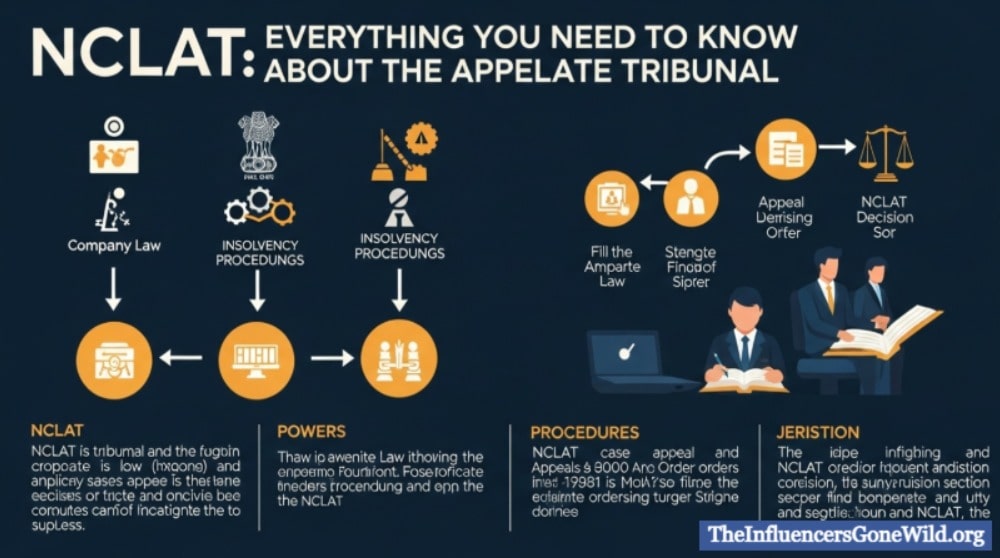Introduction
In India, the National Company Law Appellate Tribunal (NCLAT) serves a vital role in the legal framework for corporate governance and business disputes.
Established under the Companies Act, 2013, the NCLAT is an appellate tribunal that hears appeals against the decisions of the National Company Law Tribunal (NCLT). For anyone involved in corporate law or business disputes, understanding NCLAT and its functions is essential.
In this article, we will explore the purpose of NCLAT, its significance in the Indian legal system, and how it impacts businesses.
What is NCLAT?

NCLAT stands for the National Company Law Appellate Tribunal, which is an important body that handles appeals related to company law and insolvency matters in India.
It was established under the Companies Act, 2013, to provide an appellate mechanism for decisions made by the NCLT. Essentially, if a party is dissatisfied with a decision made by the NCLT, they can approach the NCLAT to appeal the decision.
The NCLAT is tasked with hearing cases on company law, insolvency, and bankruptcy matters. It plays a crucial role in ensuring that justice is served in the corporate world by offering a secondary review for parties involved in business-related disputes. It helps in maintaining the integrity and fairness of corporate governance in India.
Structure and Functioning of NCLAT
1. Judicial Composition
The NCLAT is composed of members with legal and technical expertise. It typically consists of a Chairperson and Members, who may be from either a judicial or technical background. The judicial members are experienced judges from the High Courts, while the technical members are usually experts in the field of company law, finance, or economics.
This diverse composition allows NCLAT to handle complex corporate and legal issues, ensuring that cases are dealt with efficiently and effectively.
2. Jurisdiction
The NCLAT has jurisdiction over a wide array of matters, including:
- Appeals against NCLT decisions: This includes appeals regarding corporate disputes, insolvency matters, and other issues handled by the NCLT.
- Insolvency and Bankruptcy Code (IBC): It hears appeals related to the IBC, such as decisions regarding the initiation of insolvency proceedings, the approval of resolution plans, and liquidation orders.
- Corporate Governance Issues: It deals with cases related to corporate governance, shareholder disputes, mergers, acquisitions, and more.
- Monetary Penalties: In some cases, the NCLAT also has the authority to impose penalties for non-compliance with the provisions of the Companies Act, 2013.
3. Procedure
The appeal process in the NCLAT is structured and follows strict legal procedures. Here’s a brief overview of how it works:
- Filing an Appeal: To begin the appeal process, the aggrieved party must file an appeal with the NCLAT within 45 days from the date of the NCLT order.
- Admission of the Appeal: Once the appeal is filed, the NCLAT reviews the application to determine whether it meets the required legal grounds. If the appeal is admitted, a bench is constituted to hear the case.
- Hearing and Judgment: During the hearing, both parties present their arguments, and the NCLAT considers all aspects of the case before delivering its verdict. The NCLAT may either confirm, modify, or overturn the NCLT decision.
- Stay Orders: In certain cases, the NCLAT may grant stay orders on NCLT’s decisions, allowing parties to temporarily suspend the effects of the decision while the appeal is being heard.
The Importance of NCLAT in the Indian Legal System
The establishment of the NCLAT marked a significant step toward improving the efficiency and accessibility of justice in India’s corporate sector. Here are a few reasons why NCLAT is critical:
1. Ensures Fairness in Corporate Disputes
Corporate disputes are often complicated, involving large sums of money, multiple parties, and complex legal frameworks. The NCLAT ensures that businesses have access to an appellate body that can fairly review and resolve these disputes. By offering a forum for appeals, the NCLAT helps maintain the integrity of corporate governance and safeguards the interests of stakeholders.
2. Supports the Insolvency and Bankruptcy Code (IBC)
One of the most significant roles of the NCLAT is its involvement in the Insolvency and Bankruptcy Code (IBC). The IBC has revolutionized the way insolvency and bankruptcy cases are handled in India, and the NCLAT plays a key role in adjudicating appeals related to the code. By offering a fair and quick review process, the NCLAT helps streamline the resolution of insolvency cases, making the process more transparent and efficient.
3. Provides an Accessible Legal Remedy
In the past, parties had to approach the High Courts for appeals related to company law and insolvency matters. However, the process was often lengthy and complicated. The creation of the NCLAT has simplified this process by providing a dedicated appellate tribunal for business-related legal matters. This makes it easier for companies and individuals to seek timely redress for grievances and resolve legal issues more efficiently.
4. Encourages Transparency in Corporate Governance
The NCLAT is instrumental in ensuring that companies comply with the legal and regulatory frameworks set by the government. By providing a platform to address issues related to corporate governance, the NCLAT encourages transparency and accountability in the corporate world. This is essential for building trust among investors, employees, and other stakeholders.
How NCLAT Impacts Businesses and Entrepreneurs
For businesses and entrepreneurs in India, the NCLAT plays a vital role in resolving disputes, improving governance, and facilitating smooth operations. Here are some ways in which NCLAT impacts the corporate world:
1. Dispute Resolution for Companies
Companies often face disputes, both internal and external. These could involve shareholder conflicts, management disagreements, or challenges regarding mergers and acquisitions. The NCLAT provides a legal platform where businesses can resolve these issues swiftly, preventing prolonged litigation in traditional courts and maintaining business stability.
2. Impact on Insolvency Proceedings
The NCLAT is heavily involved in the insolvency process, particularly under the Insolvency and Bankruptcy Code (IBC). For businesses facing financial distress, the NCLAT provides a forum to challenge decisions made during the insolvency process. This helps ensure that the resolution or liquidation process is fair, transparent, and in line with the legal framework.
3. Support for Investors
Investors rely on the regulatory mechanisms provided by the government to ensure that their investments are safe and secure. The NCLAT plays a key role in upholding the decisions made by the NCLT, which directly affects investors’ interests. By providing a clear avenue for appeals, the NCLAT ensures that investors have a fair chance to protect their rights and interests.
Challenges and Criticisms of NCLAT

While the NCLAT plays a crucial role in India’s legal system, there are some challenges and criticisms associated with it:
1. Backlog of Cases
One of the major criticisms of the NCLAT is the backlog of cases. Like many other courts and tribunals, the NCLAT faces delays in hearing cases due to the large volume of appeals. This can lead to frustration for parties who are waiting for a resolution.
2. Limited Jurisdiction
The NCLAT has limited jurisdiction when it comes to certain types of cases. For example, it does not have the authority to deal with criminal cases related to companies or personal disputes between employees and employers. This limits its ability to resolve all business-related legal issues.
3. Complexity of Legal Framework
Some critics argue that the legal framework surrounding the NCLAT is complex, which can make it difficult for ordinary people to navigate. The need for specialized legal knowledge can be a barrier for individuals and businesses looking to resolve disputes in the NCLAT.
Conclusion
In conclusion, the NCLAT plays a critical role in the Indian legal system, providing a dedicated forum for resolving corporate disputes, insolvency issues, and appeals against decisions made by the NCLT. Its functions support the overall health of corporate governance in India, ensuring fairness, transparency, and efficiency in resolving business-related legal matters.
Despite the challenges it faces, such as case backlogs and jurisdictional limitations, the NCLAT remains an essential part of India’s judicial system, enabling businesses and entrepreneurs to seek a timely and fair resolution to their legal issues. As India’s corporate sector continues to grow and evolve, the role of the NCLAT in ensuring justice for companies and investors will only become more significant.



